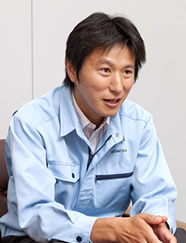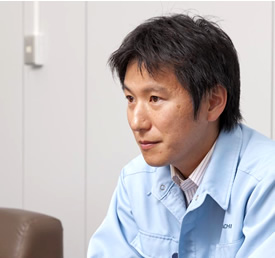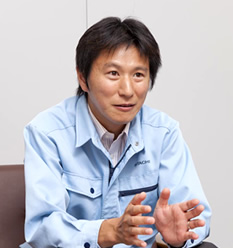![]()
I am in charge of designing the cooling of inverters, which will be used in next-generation hybrid electric vehicles. I have been working consistently on cooling designs since I joined the company, starting with cooling systems for PCs, servers, projectors, and other electronic devices for the first two years of my experience here.
With my current job, I deal with both domestic and international customers. For this reason, I often write technical documents in English, and since there are a lot of employees from overseas surrounding me, almost all official terms in the company's documents are also in English. There are also many telephone / web meetings with customers overseas, so not only must I be able to understand what I read, I also must be able to understand spoken English. I am motivated in my work by my good fortune at being able to work in an environment where people are always pursuing the highest level of performance in the world, and by the pride I feel at being involved in cutting-edge research and development.

Although I had originally planned on pursuing a postgraduate degree right after graduating from my Japanese university, my English scores weren't as high as I wanted them to be on my graduate school entrance exams, so I made the decision to study abroad in order to overcome this shortcoming.
Before enrolling a graduate school in the U.S., I spent one year at a language school, which was very helpful because it gave me a chance to learn real, living English by interacting with friends. Although I was going to pursue a master's degree when I first started attending university, my adviser praised my grades in mechanical engineering, which was my field of specialty, and recommended that I work towards a doctorate. This is why I decided to take on the challenge of an accelerated program that would allow me to pursue a master's degree and a doctor's degree, both at the same time. I also have fond memories of my time traveling all around the United States with my professors whenever there was a conference presentation during this concentrated four-year program of studying abroad.
Although I also experienced difficulties at first as I adapted to life in another country, by studying abroad, I was able to strengthen my field of specialty even further, while at the same time overcoming my weakness in English.

Even after I joined this company, I still valued the ability to work in an environment that offers the benefit of many opportunities for conference presentations. I think the mission of a researcher is to present results far and wide, both domestically and internationally, and to have as many engineers as possible evaluate their results. Hitachi's main job is to use monozukuri to meet the needs of its customers, but we also do a great deal of basic research that is not directly connected to any immediate product, and there are plenty of opportunities to present results.
Most of the participants from Japan at the academic conferences I attended in the US while studying abroad were associated with universities, but Hitachi had the most presenters from Japanese companies. I think there are very few companies like Hitachi in the world, with the ability to balance their main mission of engineering with academic fields.
Actually, given that this is a workplace environment where opportunities come around to anyone willing to raise their hand, I have been able to make presentations at academic conferences at a pace of once per year inside, and once per year outside Japan. Not only that, I have always had a dream of working overseas since I joined the company, and I am positive that I will be able to make this dream come true at some point by working here.
The most important result of my time studying abroad was the realization that my rivals are not those I work with, or the other Japanese companies, but rather the world-class engineers I studied with (in other words, achieving a global perspective). When I imagine them at work in countries around the world, it sets my heart racing. Many exchange students take advantage of assistance from their national government, or scholarship systems, and are extremely motivated because they are put under pressure whereby if their grades are bad, they will have to go home to their country. I think it was while engaging in friendly competition with these students that I developed my own ambition for research, as well as a positive approach that allows for no corner-cutting.
Although my field of specialty when I was a student was thermofluids, and this is still directly connected to what I am currently working on, since the scales are different between a university and a company, the necessary engineering sense also differs. Nowadays, however, the fact that my monozukuri is helping the world makes me feel that this work is worthwhile. In the future, I would like to extend my studies widely to fields surrounding my core of cooling design, while polishing my ability to integrate in order to optimize my monozukuri efforts.

I started becoming vaguely aware of job searching about a year before graduating my university. Since in the US, local companies sometimes contact students, I thought that working overseas would be one option for me.
As I was considering my job searching options, while I was visiting home, I sent e-mail to someone I knew who worked at Hitachi, asking if I could visit the research laboratory. This led to me being interviewed on the day of the tour, and everything progressed rapidly after that, with the job offer and my decision to accept employment.
The employee I approached was a person I became acquainted with and ran into a number of times at academic conferences in the US. He was open with me, as we were both researchers who gave presentations at academic conferences, and I've been told that he positively assessed my proactive stance.
Although my job searching experience was probably a somewhat unusual case, actually there are a lot of engineers who think that making presentations at academic conferences is a great way to expand one's network.
| Wake up | |
| Go to work Desk work, including creating documents, checking e-mail, simulating experiments, and so on. |
|
| I visit customers for meetings on many occasions in the morning, and sometimes I even travel overseas. | |
| Lunch The company cafeteria offers me a chance to interact with members of other departments, and to hear what is going on in a broad range of fields other than my own. This is a precious source of ideas in my own field of technology as well as in the broader sense. |
|
Search through foreign literature and documents in the research laboratory's library space. |
|
Set actual air flow with a wind tunnel and verify that the device being researched meets cooling specifications. |
|
Relax in the break room while listening to junior researchers and advising interns. |
|
| Leave work Even when I am busy with work, I make sure to switch things up by valuing my private time as well, to keep my work efficiency level high. |
|
| Dinner This is precious time that I spend with my family, including my kid in kindergarten. |
|
| Go to bed |